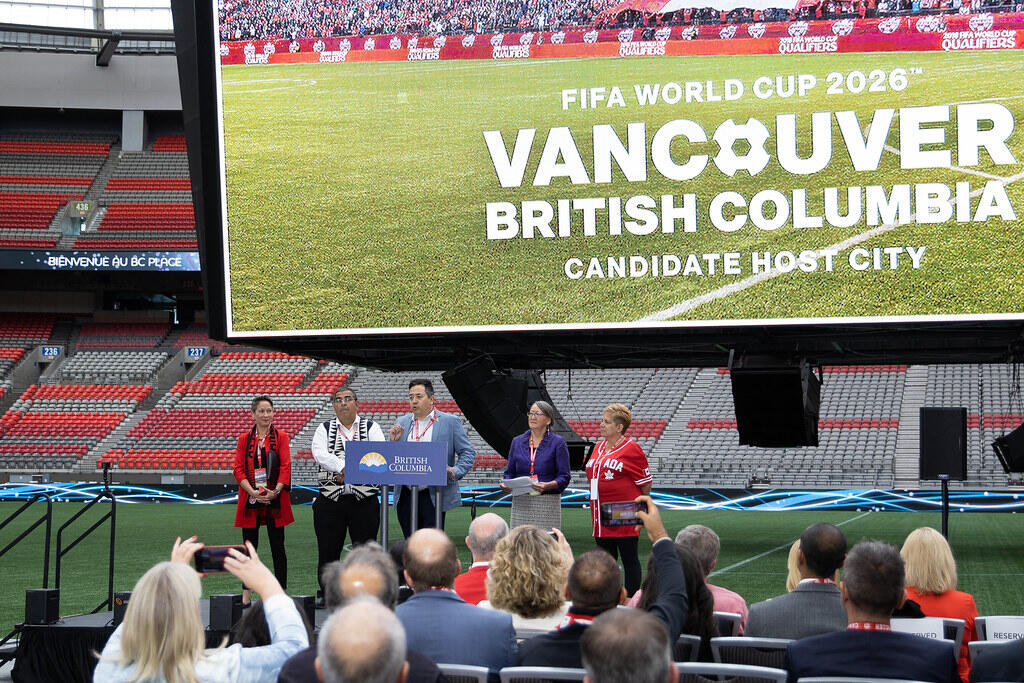It’s a moment when three countries and an entire continent collectively say: ‘We are united as one to welcome the world and deliver the biggest, best and most inclusive FIFA World Cup ever.
Gianni Infantino, FIFA President
The FIFA World Cup 2026 will be a historic moment for Canada, as the country co-hosts the tournament with the United States and Mexico. It will be the first time the World Cup features 48 teams, and Canada will play a bigger role than ever before. Hosting the World Cup is expected to boost the popularity of soccer in Canada, especially among kids and young players.
With more attention on the sport, professional leagues like the Canadian Premier League (CPL) could grow faster. There’s also hope for more investment in soccer facilities, coaching, and local programs, giving young athletes more chances to train and succeed.
The World Cup could become a turning point for the future of soccer in Canada.

Canada’s Role in Hosting The 2026 World Cup
Canada is playing a major role in the 2026 World Cup games in Canada, which will be part of the first-ever 48-team FIFA World Cup.
For the first time, three countries — Canada, the United States, and Mexico — will share hosting duties for this global event. This marks a historic moment for Canadian sports, as it’s only the second time Canada has hosted a senior men’s FIFA tournament (the first being the U-20 World Cup in 2007).
Two Canadian cities have been selected to host matches: Toronto and Vancouver.
🇨🇦 Host Cities: Toronto & Vancouver
⚽ Matches: 10 group-stage games
🎟️ Qualification: Canada’s national team qualifies automatically as co-host
Toronto’s BMO Field, known for its electric atmosphere and as the home of Toronto FC, will welcome fans from around the world. Vancouver’s BC Place offers a modern, high-capacity stadium with a retractable roof and a rich history of hosting major sporting events — including the 2015 Women’s World Cup Final.
Canada is expected to host 10 matches, all in the group stage, giving fans the chance to see top international teams in action on home soil. And with Canada’s men’s national team automatically qualified as one of the host nations, it’s a rare and exciting opportunity for fans to watch their team compete in a World Cup at home. This spotlight on Canadian soccer players could inspire a new generation of athletes and boost local pride like never before.
The 2026 World Cup will not only bring international attention to Canada’s stadiums and cities — it will also help elevate the status of soccer in the country and strengthen Canada’s place on the global football map.
Economic and Cultural Benefits of Hosting the World Cup
Hosting the World Cup in Canada is expected to bring major economic benefits across the country. With thousands of international fans traveling to cities like Toronto and Vancouver, local businesses — from hotels and restaurants to taxis and shops — can expect a significant boost. Ticket sales, tourism spending, and international media coverage will also generate millions of dollars, supporting jobs and local economies.
tickets will be sold across North America
But the impact goes beyond money. This event gives Canada the chance to show the world what makes it unique — from its diverse cultures and languages to its famous hospitality. Fans from around the globe will experience Canadian cities firsthand, which can help grow long-term tourism and improve Canada’s global reputation.
Infrastructure upgrades are another key benefit. Stadiums will be improved to meet international standards, and public spaces and transportation systems will also get a refresh. These upgrades will continue to benefit Canadians long after the final match has been played.
For Canadian soccer teams, this global attention can help increase local support, sponsorships, and media coverage — all of which contribute to a stronger, more visible soccer culture in Canada. Whether it’s in big stadiums or small community fields, the World Cup could be a turning point for the sport’s future here.
Challenges and Preparations for The 2026 World Cup
While the excitement around the 2026 World Cup is huge, hosting an event of this scale comes with its own set of challenges. Since Canada is co-hosting the tournament with the United States and Mexico, there’s a lot of coordination needed to make sure everything runs smoothly across borders. From travel logistics and scheduling to consistent security standards, this kind of international teamwork requires careful planning.
2023–2024
Stadium & City Upgrades
Infrastructure renovations begin in Toronto and Vancouver, including stadium improvements and urban planning.
2025
Final Preparations Begin
Volunteer recruitment, test events, and final stadium checks take place to ensure Canada’s readiness.
Thursday, 11 June 2026
Opening Match in Mexico
FIFA World Cup kicks off as Mexico #1 plays the first match at Estadio Azteca, Mexico City.
Friday, 12 June 2026
Canada’s First Match
Group B opener: Canada #1 plays in Toronto — the national team’s first-ever men’s World Cup match at home.
Wednesday, 17 June 2026
Second Group Match in Vancouver
Canada #2 faces their next opponent at BC Place, bringing the World Cup to the west coast.
Tuesday, 23 June 2026
Canada Wraps Up Group Stage
Final group-stage match (Canada #3) hosted again at BC Place, Vancouver.
Friday, 3 July 2026
Knockout Game in Vancouver
BC Place hosts a Round of 32 match — Canada may appear here depending on results.
Tuesday, 7 July 2026
Vancouver Hosts Round of 16
One of the final 16 matches is played at BC Place, continuing Canada’s key hosting role.
Sunday, 19 July 2026
World Cup Final in USA
The tournament concludes with the final at New York New Jersey Stadium.
On the home front, Canada needs to make big investments in areas like transportation, accommodation, and stadium security. Cities like Toronto and Vancouver are preparing to welcome large numbers of visitors, which means public transit systems, airports, and hotels must be ready to handle the pressure. Safety and accessibility will be key priorities during the tournament.
Environmental sustainability is also a big part of Canada’s preparation. Stadium upgrades and event planning must follow green practices — from reducing waste and energy use to encouraging public transit and limiting carbon emissions. Hosting the World Cup presents a significant opportunity for Canada to demonstrate leadership not only in sports, but also in organizing events that are responsible and forward-thinking.
The Legacy of the 2026 World Cup in Canada
The 2026 World Cup will be more than just a month of exciting matches — it will mark a turning point for the future of soccer in Canada. As one of the host nations, Canada has a unique opportunity to create a long-lasting impact on both the sport and the country as a whole.

One of the most important outcomes will be the inspiration it provides for young Canadians. When kids see the world’s top players competing in their own cities, it creates a spark — one that could lead many to dream of becoming soccer players themselves.
As interest grows, so does the demand for clearer pathways in youth development, which makes it easier for kids and teens to understand how to become a soccer player in Canada. With the spotlight on Canadian soccer teams and athletes, there’s a real chance to boost participation in the sport from the grassroots level up. Schools, youth leagues, and local clubs may all see increased involvement, helping build a stronger foundation for the next generation of Canadian soccer players.
The tournament could also open the door for Canada to host more international sporting events in the future. Successfully organizing part of the largest World Cup ever held would prove that Canada is capable of handling major global competitions.

This could attract events like the Women’s World Cup, the Olympics, or more continental tournaments, further enhancing the country’s global sports reputation.

Beyond the excitement and media attention, the World Cup is expected to significantly strengthen Canada’s soccer infrastructure. Investments made in stadiums, training facilities, and public transport will benefit communities long after the final match is played.
Local soccer organizations and Canadian Premier League (CPL) teams are already working to expand youth development programs, improve coaching, and build clear pathways from amateur to professional play.
Ultimately, the legacy of the 2026 World Cup in Canada won’t just be remembered through highlight reels or trophies — it will live on in the players it inspires, the communities it connects, and the systems it helps build. This tournament could be the moment that transforms soccer in Canada from a growing sport into a national force.
Summarize with AI:















